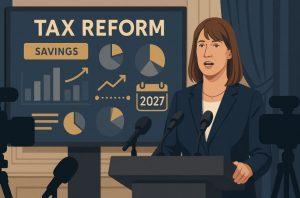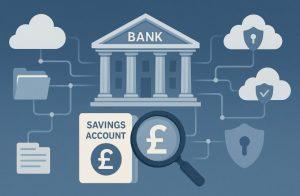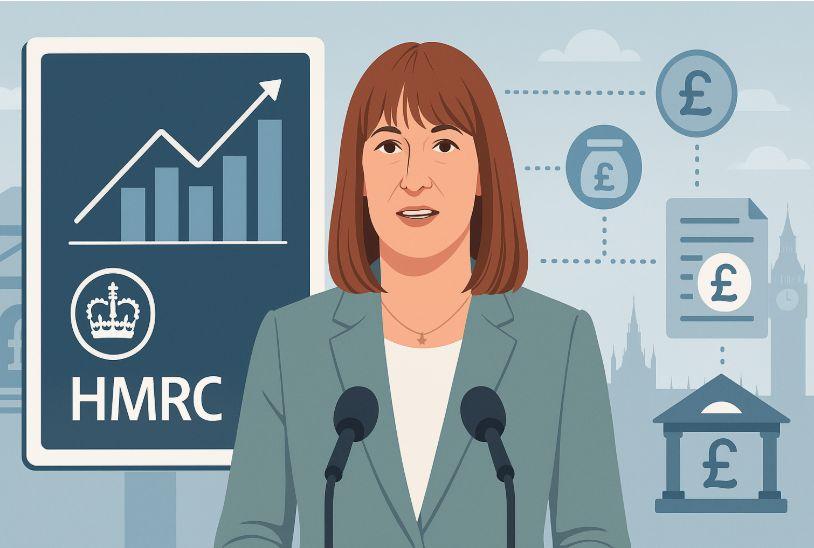Chancellor Rachel Reeves has introduced a major reform to how savings income is taxed in the UK. Set to take effect from April 2027, the new policy will allow HMRC to automatically collect tax on savings interest by requiring banks to share customers’ National Insurance numbers.
This marks a significant shift in tax administration, aiming to improve data accuracy, reduce fraud, and streamline the process for millions of savers especially in a time of growing fiscal pressure.
What Is Rachel Reeves’ New Tax Crackdown All About?

In an unprecedented move to tighten tax collection and close loopholes, Chancellor Rachel Reeves has quietly approved new regulations that will significantly affect how savings tax is collected across the United Kingdom.
The legislation, expected to be formalised in 2026 and rolled out by April 2027, empowers HM Revenue & Customs (HMRC) to collect taxes on savings interest more efficiently by working closely with banks and financial institutions.
Under the new rules, UK banks will be required to ask both new and existing savings account holders for their National Insurance numbers. This data will allow HMRC to more accurately track individuals who exceed their Personal Savings Allowance (PSA), thereby facilitating the automatic deduction of tax owed through the PAYE (Pay As You Earn) system without the need for a self-assessment tax return in many cases.
This measure is part of a wider Labour government strategy to restore fiscal stability, address income inequality, and recover billions in unpaid tax amid stagnant economic growth and public finance pressures.
How Will the New Rules Affect UK Savers?
For millions of savers across the UK, this shift marks a substantial change in how their savings income is taxed. Previously, most savers whose interest income exceeded the PSA were required to submit a self-assessment tax return. This process often caused delays and confusion, particularly when the information provided by banks was incomplete or misaligned with HMRC records.
HMRC Will Now Use Bank Data More Effectively
Banks will be obligated to share customer details most importantly, National Insurance numbers with HMRC. This data will be matched with taxpayers’ records, allowing for real-time assessment and adjustment of PAYE codes to collect the right amount of tax.
Workers Will See Deductions in Their Payslips
Rather than waiting for a bill, affected individuals will have tax deducted directly from their salary through PAYE, creating a more streamlined and automated system. While this removes some administrative burdens, it also raises concerns about visibility and taxpayer awareness of what is being deducted and why.
Why Is HMRC Changing the Way It Collects Savings Tax?
The current method of collecting tax on interest income has proven flawed. According to HMRC, 20% of data provided by banks on savings interest is “unreadable”, which means it cannot be used for automatic tax collection. This discrepancy creates errors, underreporting, and lost revenue.
To address this:
The New Approach Prioritises Data Accuracy
By requiring National Insurance numbers, HMRC aims to ensure accurate matching of third-party data with individual taxpayer records. This means fewer mistakes and better enforcement.
Economic Pressures Are Driving Urgency
The National Institute of Economic and Social Research (NIESR) has forecast that the UK government may face a £50 billion shortfall due to sluggish economic growth and Labour’s adjusted public spending priorities. This tax reform is part of a broader effort to recover lost revenues and prevent further borrowing.
What Does This Mean for Your Bank and Account Data?

This new compliance requirement places a significant onus on banks to adapt their systems and processes. Notably, the change affects:
Savings Accounts, Not Current Accounts
Banks must collect additional personal data for savings accounts, particularly National Insurance numbers. However, current account holders are currently exempt, although insiders have hinted that future changes could extend these rules.
Increased Cost and Administrative Burden for Banks
Banks have expressed concerns about the cost of implementing the system, particularly for legacy savings accounts where customer contact information may be outdated. Some institutions estimate the reform could cost up to £10 million per bank.
Data Privacy and Transparency Questions
Multiple industry groups, such as the Low Incomes Tax Reform Group (LITRG), have urged that any tax-related data shared by banks with HMRC should also be made accessible to customers. This, they argue, would enhance transparency and allow individuals to cross-check the information for accuracy.
Could This Lead to More Intrusive Tax Practices?
Critics have voiced concerns that this reform represents a growing trend of state overreach. Former Conservative Cabinet Minister Sir David Davis has publicly criticised the move, calling it “the most intrusive part of the state.”
Is There a Risk of Diminished Financial Privacy?
As banks collect and transmit more personal data to government authorities, individuals are questioning how securely their information will be handled and whether there will be sufficient transparency around what data is shared and how it’s used.
Will the Reforms Impact Taxpayer Awareness?
Automating the process could result in savers becoming less aware of their tax obligations, particularly if they never see a breakdown of what they owe or how it was calculated. Experts warn that this could erode financial literacy among UK taxpayers.
Who Will Be Affected the Most by These Changes?
While the reform will impact all UK residents with interest-bearing savings accounts, the level of effect will vary depending on income level and total interest earned.
| Taxpayer Type | Personal Savings Allowance | Affected by New Rules? | Tax Deducted Automatically? |
| Basic Rate Taxpayer (20%) | £1,000 | If interest > £1,000 | Yes |
| Higher Rate Taxpayer (40%) | £500 | If interest > £500 | Yes |
| Additional Rate Taxpayer (45%) | £0 | Any interest taxed | Yes |
| Children (under 16) | No NI number yet | Possibly – unclear | Possibly |
| Low-income taxpayers | Depends on PSA usage | Potentially | Yes (if interest > PSA) |
How Should Savers Prepare for the 2027 Implementation?

Although the changes won’t take effect until April 2027, now is the time for individuals to prepare. Financial advisers recommend that savers:
Start Tracking Interest Income
Even though deductions will be automated, it’s important to keep personal records of savings interest in order to cross-check against any HMRC assessment.
Understand Your Personal Savings Allowance
Many savers are unaware of their allowance limit, which could lead to unexpected deductions. Knowing your allowance threshold ensures better financial planning.
Review Your Tax Code Regularly
After implementation, any changes to your PAYE tax code may reflect interest income deductions. Understanding these changes will help avoid surprises in your monthly payslip.
What Are the Costs Involved for HMRC and Banks?
This policy is not without its financial implications. According to HMRC:
- It will cost the government approximately £35 million to implement the system
- UK Finance, representing the banking industry, estimates individual banks may face costs up to £10 million each
- Older savings accounts may take longer to integrate, creating additional delays and customer service challenges
Additionally, only 10% of customers typically respond to correspondence from banks, meaning outreach and data collection could face delays, undermining the timeline.
Is This a Step Towards a Fully Automated Tax System in the UK?
The reforms appear to be part of a broader HMRC vision of automation in taxation. The goal is to reduce reliance on self-assessment returns and eliminate errors and fraud by collecting accurate, real-time data.
Could This Be the End of Self-Assessment for Many?
If successful, HMRC may expand similar practices to other areas of personal finance. This could result in fewer individuals needing to file tax returns manually, especially those with straightforward income profiles.
How Will Trust in the System Be Maintained?
Experts like those from LITRG emphasise that transparency will be crucial. If taxpayers don’t understand their tax deductions, trust in HMRC could be undermined. Tax summaries and breakdowns should be made available alongside PAYE changes.
What Are Experts and Industry Groups Saying About the Reform?

Feedback from tax professionals, industry groups and policy experts has been mixed.
Mike Warburton: Tax Expert
He believes that while the move is logical from a data-handling perspective, savers must maintain their own records to protect themselves from potential inaccuracies in HMRC’s deductions.
Low Incomes Tax Reform Group (LITRG)
They stress the importance of translating third-party data into readable summaries for taxpayers. This would ensure fairness and prevent confusion around automated tax assessments.
Association of Taxation Technicians (ATT)
ATT has also warned that children without National Insurance numbers may fall into grey areas of tax enforcement, raising concerns about potential unfair targeting or implementation issues.
Conclusion
Rachel Reeves’ tax crackdown represents a significant shift in the UK’s approach to taxation on savings. On one hand, the reforms aim to make tax collection more efficient, accurate and less burdensome. On the other, they raise valid concerns about data privacy, transparency, and taxpayer awareness.
For the average UK saver, the key takeaway is this: start tracking your savings income now, understand your allowances, and monitor your tax code closely. The more prepared you are before 2027, the less likely you’ll be caught off-guard by automated deductions.
Resource:
FAQs
What is the Personal Savings Allowance in the UK?
The PSA allows basic rate taxpayers to earn up to £1,000 in interest tax-free, while higher rate taxpayers get £500. Additional rate taxpayers have no allowance.
Will I need to file a tax return if my savings exceed the allowance?
Not necessarily. Under the new rules, HMRC will adjust your PAYE code to deduct the tax automatically, removing the need for a self-assessment in many cases.
When will the new tax rules come into effect?
The policy will be introduced into legislation in 2026 and come into effect from April 2027.
What types of accounts are affected by this change?
The rule applies to savings accounts. Current accounts are currently exempt but could be included in future reforms.
How will HMRC know how much interest I earned?
Banks will be required to share your interest income along with your National Insurance number, allowing HMRC to match it to your tax records.
What happens if the HMRC data is incorrect?
You should keep personal records of your savings income. If discrepancies arise, you can appeal or request a correction through HMRC.
Are children’s savings accounts affected by this change?
There’s uncertainty here. Children typically don’t have NI numbers, so it’s unclear how HMRC will handle taxation for under-16s with savings accounts.









Leave feedback about this